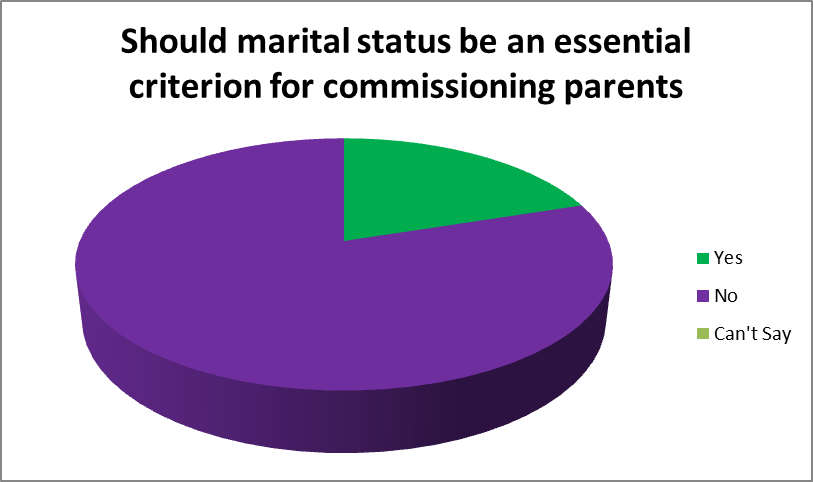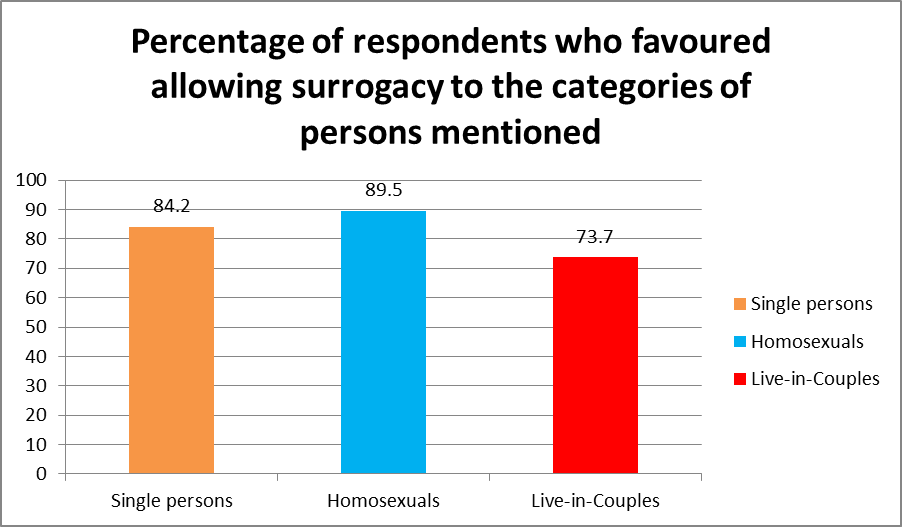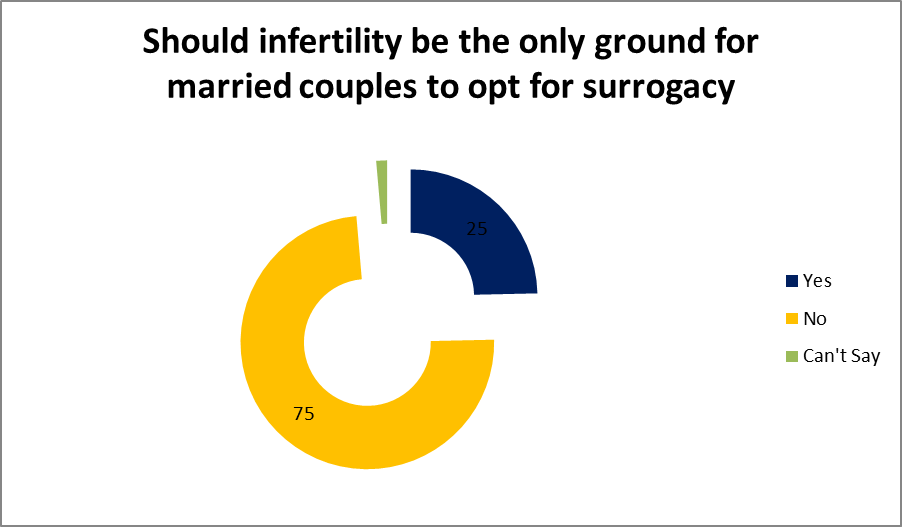Surrogacy Regulation Bill: We Must Look Beyond Marital Status, Residence and Sexuality
A Parliamentary Standing Committee has reviewed the new Surrogacy (Regulation) Bill 2016, and has raised many concerns. Maadhyam takes a look at all sides of the issue.

The Parliamentary Standing Committee on Health and Family Welfare had an arduous task before it – reviewing the Surrogacy (Regulation) Bill. Arduous because the Bill took a strong position on many aspects of surrogacy including calling for only altruistic surrogacy to be undertaken by married women who were ‘close relatives’ of commissioning parents.
The Committee made bold recommendations and demanded that compensated surrogacy be preferred over altruistic surrogacy. The former ensures that rights of all parties are protected and enforced whereas the latter sees a woman being left without any compensation for her reproductive labour. (Read the full report here)
Maadhyam had undertaken a public engagement exercise on the Bill and collected suggestions, opinions and views from people and experts on many of the dilemmas stirred by the Committee’s calls.
These were submitted to the Committee. As the Committee came out with its report, Maadhyam undertook an analysis to compare what the people had demanded and how the Committee has delivered. In the first part of the analysis, we looked at the recommendations from the perspective of the surrogate, and now we analyse it from the perspective of the commissioning parents.
ELIGIBILITY CONDITIONS FOR COMMISSIONING PARENTS
The Bill allows only Indian heterosexual, legally married couples, married for at least five years and medically certified infertile to opt for surrogacy.
Thus, it leaves out the following categories of persons looking to become parents through surrogacy:
- Live-in couples
- Single persons (including divorcees, widows/widowers etc.)
- Members of the LGBTQ community
- Foreign couples
- Fertile couples
STAKEHOLDER RESPONSES RECEIVED

The willingness and capability to raise a child should be emphasised rather than calling into question the marital status, fertility or sexual orientation of commissioning parents.
This was the most common argument reflected in the inputs received by Maadhyam.
Around 80% of responses were in the negative on the question of marriage as an essential criterion for availing surrogacy.
Concerns about such a practice being discriminatory against a set of people with superficial rather than a rational basis for discrimination was another recurring argument against such restrictive provisions.
Further, the following response was received when stakeholders were asked to vote for each category of persons to be so eligible:

COMMITTEE’S RECOMMENDATIONS
Marital status, nationality and sexuality
Broadening the eligibility criteria in favour of the following is recommended:
- Live-in couples- considering the modern social milieu in urban centres
- Divorced women and widows- observing the significance of the reproductive life of women to their social status, the Committee was of the view that they may be pressurised into child-bearing.
- NRIs, POI (Persons of Indian Origin) and OCI (Overseas Citizenship of India) cardholders- since they cannot be classified as foreigners; a mechanism for their complete background check and a thorough scrutiny of their documents needed.
Despite this progressive outlook, the report remains silent on the eligibility of unmarried persons and members of LGBTQ community to opt for surrogacy, in a way upholding the restriction on their reproductive choices.
The interests and needs of male divorcees and widowers are also overlooked while considering the concerned women for inclusion. This seems to be discriminatory.
Infertility
After citing international precedents set by the World Health Organisation, domestic laws and settled cases, the Committee recommends in its report that the five-year period of unprotected coitus, as a condition to be certified medically infertile should be reduced to one year.
Consequently, the waiting period after marriage for intending couples should also stand reduced. The following observations of the Committee are significant here:
- The five-year waiting period is arbitrary, discriminatory and without any definable logic.
- The provisions disregard well-indicated reasons of infertility – the current scenario of late marriages and the need to safeguard the reproductive autonomy and the right to exercise choice.
Around 75% of stakeholders responded on these lines:

The Committee makes a note of the fact that there could be other medical reasons for opting for surrogacy and therefore, it recommends that if medical tests prove that couples have consistently failed to conceive then, that should be enough to support their decision to opt for surrogacy.
There shouldn’t be a need to procure a certificate of infertility – infertility remains a stigma, and such tests can cause psychological harm to the couple. The report notes:-
This is a violation of the basic rights of privacy and reproductive autonomy of the medically infertile persons who whilst maintaining the privacy of their medical problems have the right to surrogacy.
The report, however, is silent on whether a couple could opt for surrogacy despite being medically fit for instance in cases where a woman doesn’t want to carry a child due to personal and/or professional reasons.
OTHER KEY RECOMMENDATIONS
The committee makes the following recommendations regarding other significant issues relating to The Bill:
- The mechanism for obtaining the consent of the surrogate: There should be an elaborate mechanism undertaken by a competent authority after medical and psychological counselling. An option of withdrawal should also be there for the surrogate.
- Surrogacy agreement: The Bill should provide for a registered and legally binding comprehensive surrogacy agreement containing all safeguards such as clauses relating to insurance, compensation, the manner of payment, pre/post delivery care, nourishment etc.
- Abortion during surrogacy period: The requirement of approval of appropriate authority for abortion during surrogacy period should be done away with. The abortion should be governed by the existing Medical Termination of Pregnancy Act, 1971.
- Second Surrogacy – Provisions for intending couple to avail surrogacy services again, if the child born out of surrogacy is mentally or physically challenged or suffering from fatal illnesses or life-threatening disorders etc.
- Child rights: There should be a comprehensive provision entailing insurance coverage for the unborn child. Apart from insurance, bank guarantees/FDs should also be there for the emergent situations.The state should take responsibility for the abandoned child born out of surrogacy.
- Penal provisions: The Bill should have explicit provisions with respect to offences like human trafficking, abduction, sex-selective practices etc. Further, the quantum of punishment under the Bill should correspond to the gravity of offences. Also, the Bill should provide for maximum punishment, which is not provided for.
- Regulation of ARTs: As there are no separate surrogacy clinics, the regulation of Assisted Reproductive Technologies clinics (governed by The Draft ART Bill, 2014) is needed to make the Bill meaningful. Passing the ART Bill before Surrogacy Bill would be ideal.
The Committee has made some well-meaning recommendations, though it could have done more. As we approach the Winter Session of Parliament, it would be interesting to see how the government reacts and adapts to the Committee’s report – it could be conservative and advance with a Bill which ignores ground realities or it could be progressive and propose changes which advance reproductive autonomy as well as protect women and children from exploitation.
Featured image courtesy Facebook.
Like this story? Or have something to share?
Write to us: [email protected]
Connect with us on Facebook and Twitter.
NEW: Click here to get positive news on WhatsApp!
If you found our stories insightful, informative, or even just enjoyable, we invite you to consider making a voluntary payment to support the work we do at The Better India. Your contribution helps us continue producing quality content that educates, inspires, and drives positive change.
Choose one of the payment options below for your contribution-
By paying for the stories you value, you directly contribute to sustaining our efforts focused on making a difference in the world. Together, let’s ensure that impactful stories continue to be told and shared, enriching lives and communities alike.
Thank you for your support. Here are some frequently asked questions you might find helpful to know why you are contributing?


This story made me
- 97
- 121
- 89
- 167











